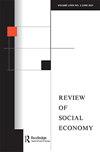The epistemic potentials of workplace democracy
IF 1.2
Q2 ECONOMICS
引用次数: 11
Abstract
Abstract Can the alleged conflict between efficiency and justice in the debate about workplace democracy be overcome? We argue that this might be possible by applying arguments from epistemic democratic theory to workplaces. To do so, we first define our notion of workplace democracy, and argue that the relevant decisions in companies concern the search for mutually beneficial solutions for workers, owners and society at large, or the fair management of conflicts between these groups. On this basis, we examine which epistemic advantages of democracy apply to decision-making within companies. We argue that the inherent reflexivity and adaptability of democratic systems can be a great advantage in the uncertain and changeable contexts in which companies operate. We reply to some objections, including the claim that feedback from markets provides sufficient information for companies, and conclude by calling for experiments with democratic practices in workplaces.工作场所民主的认知潜力
工作场所民主之争中所谓的效率与正义的冲突能否克服?我们认为,通过将认识论民主理论的论点应用于工作场所,这可能是可能的。为此,我们首先定义了工作场所民主的概念,并认为公司的相关决策涉及为工人、所有者和整个社会寻找互利的解决方案,或者公平管理这些群体之间的冲突。在此基础上,我们考察了民主的哪些认知优势适用于公司内部的决策。我们认为,民主制度固有的反身性和适应性在公司经营的不确定和多变的环境中可能是一个巨大的优势。我们回应了一些反对意见,包括市场反馈为公司提供了足够信息的说法,并呼吁在工作场所进行民主实践的实验。
本文章由计算机程序翻译,如有差异,请以英文原文为准。
求助全文
约1分钟内获得全文
求助全文
来源期刊

REVIEW OF SOCIAL ECONOMY
ECONOMICS-
CiteScore
2.60
自引率
10.00%
发文量
18
期刊介绍:
For over sixty-five years, the Review of Social Economy has published high-quality peer-reviewed work on the many relationships between social values and economics. The field of social economics discusses how the economy and social justice relate, and what this implies for economic theory and policy. Papers published range from conceptual work on aligning economic institutions and policies with given ethical principles, to theoretical representations of individual behaviour that allow for both self-interested and "pro-social" motives, and to original empirical work on persistent social issues such as poverty, inequality, and discrimination.
 求助内容:
求助内容: 应助结果提醒方式:
应助结果提醒方式:


